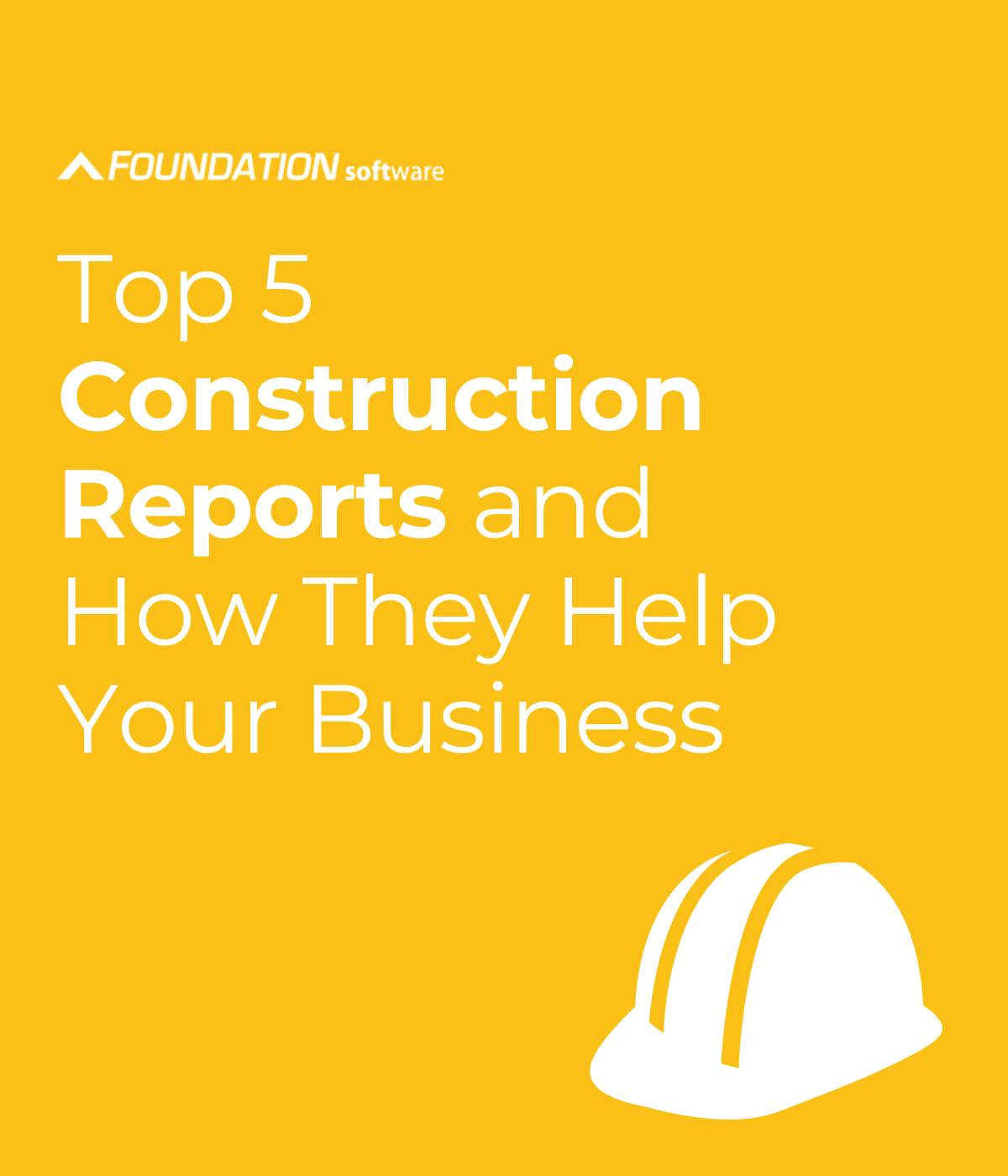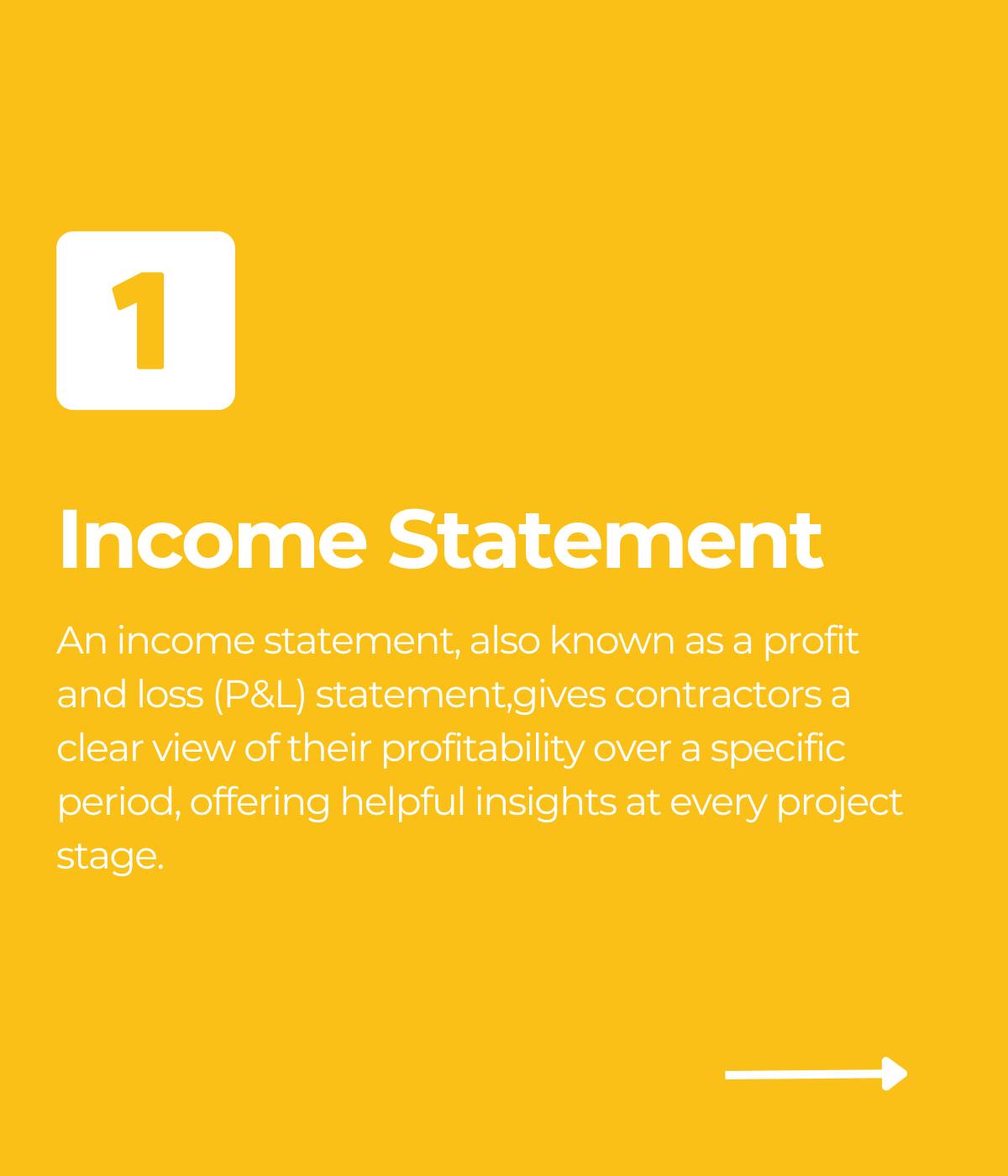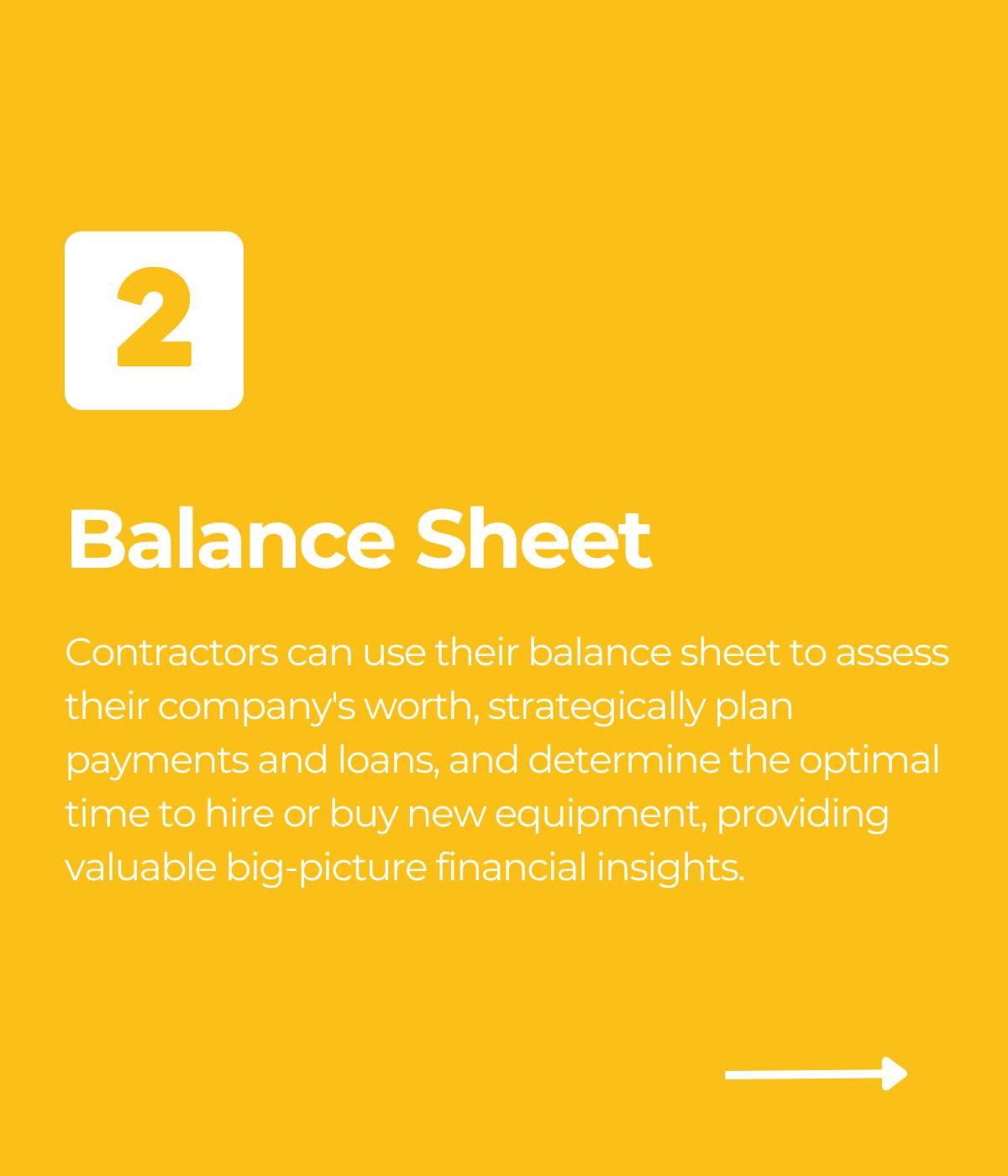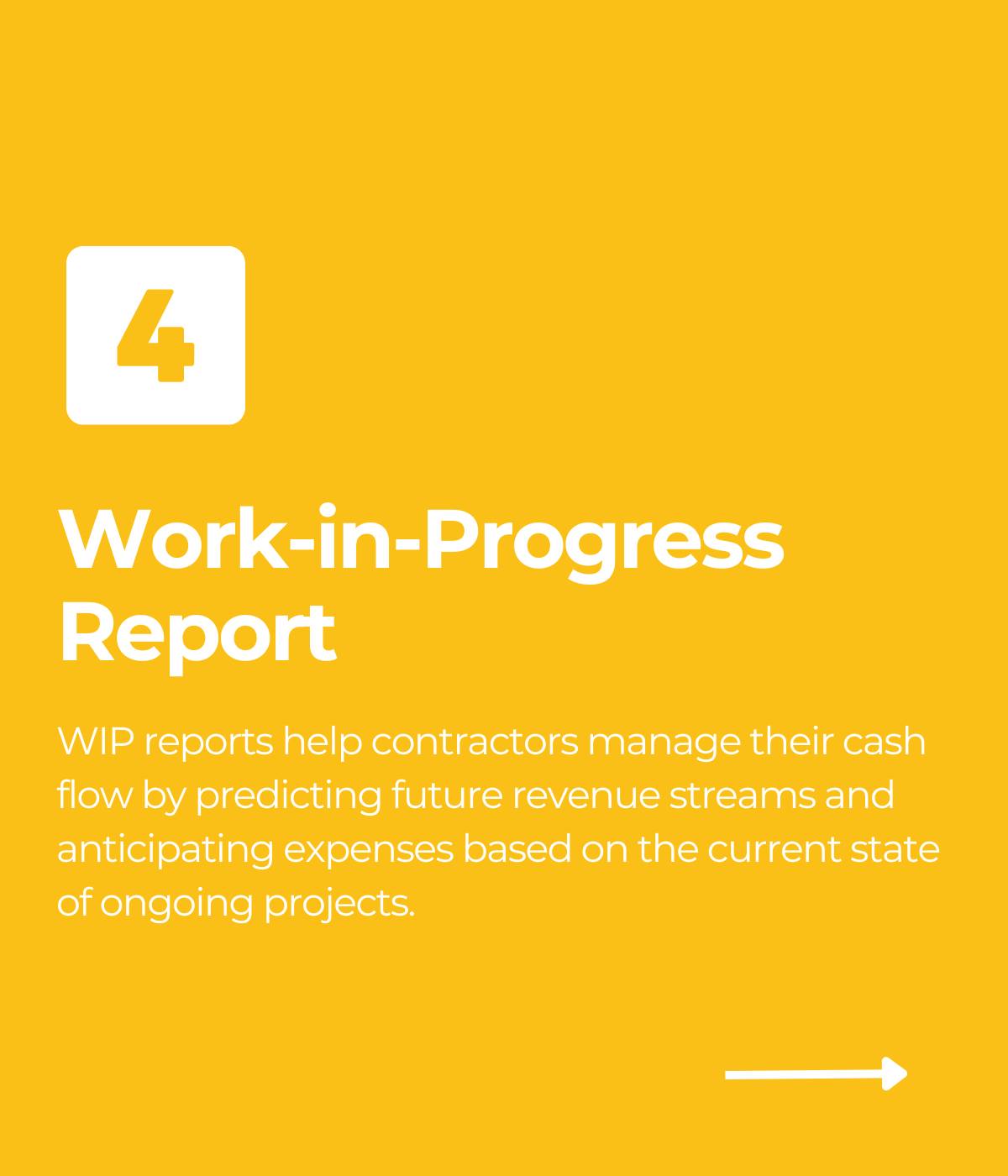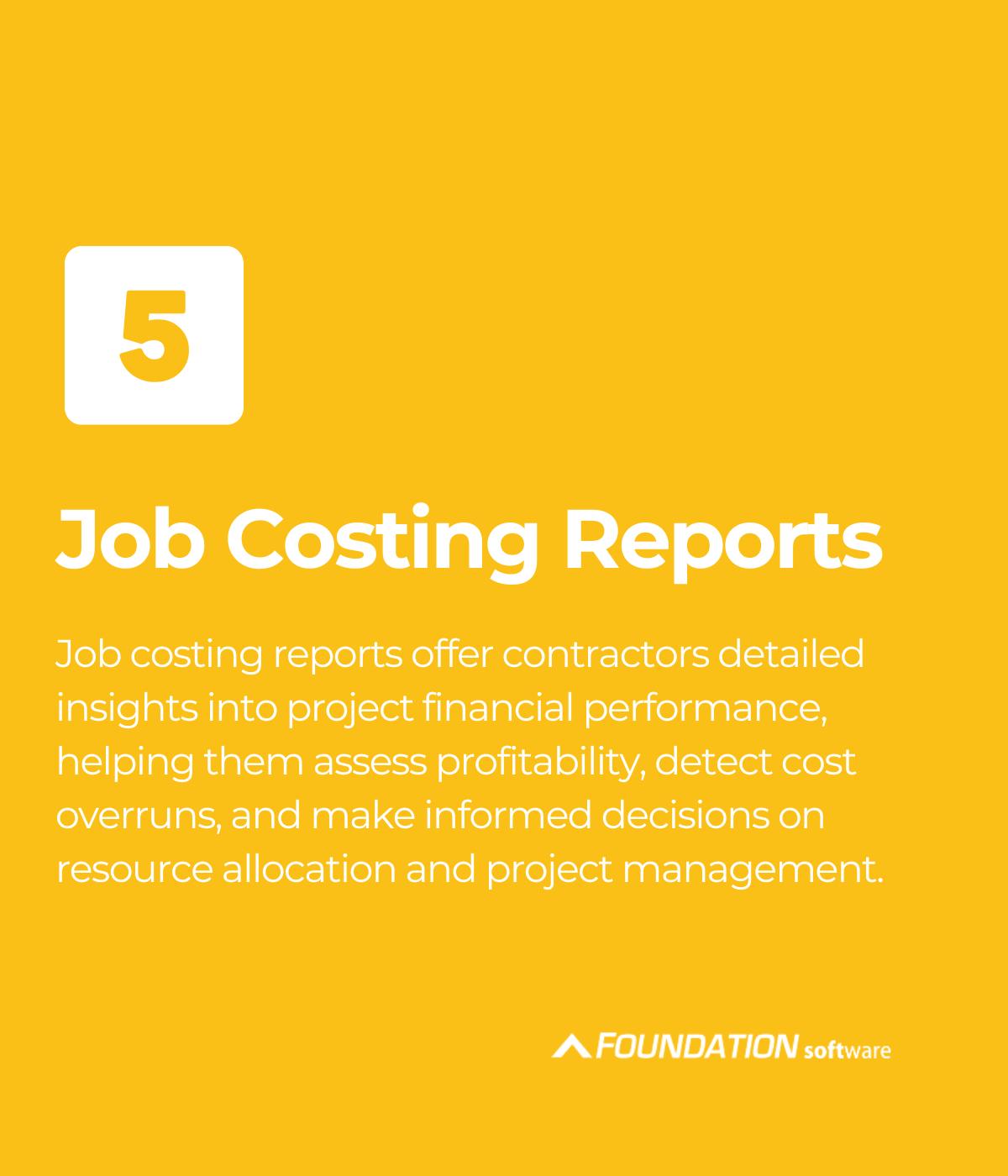
Construction is one of the top industries for startups. However, it also has one of the highest rates of failure, with 63.6% of construction startup companies closing within the first five years, whether due to a lack of business knowledge and experience, lack of finances, or lack of planning.1
You don’t have to be one of them.
Researching your market, drafting a concrete plan for how you’ll run your business, and getting help can ensure that you have a strong foundation on which to grow your business. It can also help you avoid the common pitfalls that so many new construction businesses run into.
So, where do you start?
Key Takeaways on How to Start a Construction Business:
- Before launching your construction company, conduct thorough market research and create detailed financial projections to validate your business idea and understand your potential clients.
- Prioritize excellent customer service and focus on building trust with clients to ensure long-term success and generate positive referrals.
- Follow this seven-step guide to navigate legal requirements, including proper business registration, obtaining necessary licenses and permits, and securing appropriate insurance coverage for smoother operations.
- Develop a comprehensive business plan that outlines your services, target market, and growth strategies, which will serve as a roadmap for your company and help secure funding from lenders or investors.
- Seek support from industry associations, construction professionals, and mentorship programs to gain valuable insights and resources that can contribute to the success and longevity of your construction business.
Check out our article about how to handle the challenges of your first year in the construction industry.
Get More Construction Business Tips
As you start your construction business. Get access to more resources and helpful industry tips. Fill out the form to customize your experience.
1. Research Your Local Market
Your first question should be whether a construction business is even a viable option in your area.
After all, if the construction market is already oversaturated and customers are happy with the current local companies, it might be hard to get a foothold in the industry, let alone create a successful business.
So, start with market research. You’ll want to know:
- How many local construction companies are already operating in your area
- What they specialize in
- How much they charge
- What their reputation is
Coupled with market analysis, you should also have a similar understanding of your potential customers— how many of them are there, their median age and status, their interests, etc.
Knowing these things can help you develop a better construction business plan and give you a competitive edge when you finally step out onto the playing field.
Where to Find Construction Market Research
One of the first and probably easiest places you can start your market research is with the U.S. Small Business Administration (SBA). They offer a wide range of free resources that provide hard data on customers and business markets.
For example, with the SBA, you can look up:
- The demographics of your audience (age, gender, etc.)
- Their employment statistics
- Their spending habits
- Production and sales statistics of your market(s)
- And more
While it’s a great starting point, the SBA offers more of a general overview, and you might want more specific information. This is where industry publications can help you flesh out your data.
Local and national trade publications will provide you with in-depth looks at:
- New legislation
- Trends within your trade
- Technological advancements
- New equipment
- Job stories
- How governments and contractors are investing money in projects
You can find most local publications by typing your city name + “construction industry publications” into Google. This should pull up a list of publications or direct links to some of the construction magazines in your area.
Here is an example we did for “Sacramento, California + Construction Industry Publications.”
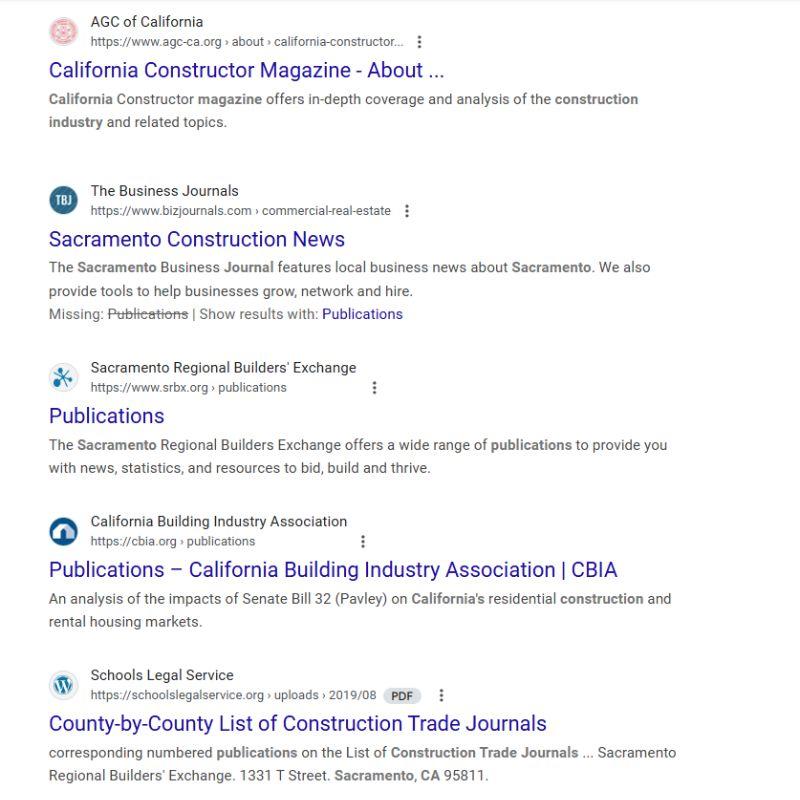
You can see the list of construction industry publications that can help your construction company startup research.
From there, you can either page through their digital issues or, if those are unavailable, set up a subscription. These magazines will be full of ads and articles about local companies and the state of the construction industry around you.
Doing Your Own Construction Market Research
Lastly, one of the best ways to gauge your potential client base is to review information on review sites and forums. This information will give you immediate feedback about:
- Common concerns from potential clients
- How your competition addresses their client’s needs
- The types of projects clients hire contractors for within your trade
- Estimates for how long certain jobs normally take
- Potential overhead costs and what you should charge
This information will be incredibly important as you craft your business plan.
2. Write Your Business Plan
After you feel you have a good understanding of your local market, you can begin drafting a solid business plan.
This is one of the most important documents you’ll create, as it can help you keep your company on track and increase your likelihood of success.
This plan is also what you’ll give to lenders to help source funding, which means it’s incredibly important to be detailed and put all that market research to good use.
Putting Together a Construction Business Plan
Standard construction business plans will include the following:
- Your business structure and how you’ll manage the business
- The types of services you’ll provide
- What kinds of jobs you’ll bid on
- Who your target market is
- The number of employees you’ll have at the beginning
- Industry trends in the local market
- How you plan to market yourself
- The initial estimated cost of starting and maintaining the business
- How much you expect to make in your first year, and other important KPIs
However, as a contractor, you’ll also want to consider your construction accounting processes in your business plan.
For example, how will you perform billing?
Some clients may want a fixed lump sum price, whereas others may wish to see a time-and-material breakdown. Net 30 billing terms can be customary, but will you offer discounts to incentivize faster payments?
You should also think about whether you plan to operate as a cash or accrual business and whether you’ll recognize revenue by a completed contract or a percentage of completion.
If you aren’t sure what would work best for you, connect with a construction CPA. They can talk with you about some of these important business considerations.
Getting Help With Your Business Plan
Don’t let the idea of a business plan intimidate you — you’re the expert in your business, and there’s always help available.
If no one within your company has formal writing experience and you’d feel more comfortable with a professional drafting the document, you can hire someone to help develop your business strategy.
Nationally and locally, there are also multiple programs you can contact for guidance. SCORE is a nonprofit mentorship program partnered with the SBA. They enable you to work with one or several mentors both online and in person.
Through the SBA, you can also access the Small Business Development Center (SBDC) list, which contains all the SBDCs in your state. They offer a variety of free business consulting services and low-cost training that can help you have a successful construction company.
Finally, there are also specific organizations aimed at helping women, minorities, and veterans get their new businesses off the ground.
3. Register Your Business
Once you have your business plan together, it’s important to register your construction business to make it a legal entity, which can provide personal liability protection, legal benefits, and tax benefits.
Business registration is usually as simple as registering the name of your company with state and local governments.
However, as not every state may provide them automatically, you should also take the extra step to register your business on the federal level to get your federal tax ID or Employer Identification Number (EIN).
This will also allow you to trademark your business name and logo with the United States Patent and Trademark Office.
4. Find the Right Licenses & Permits
After you’ve registered your business, it’s time to get your licenses and permits in order.
Depending on your state, the location of your business, the size of your company, and even the type of construction projects you plan to do (large-scale projects, infrastructure projects…etc.), you’re likely going to need business licenses or permits to operate legally — on both the federal and state level.
Federal law requires permits for certain business practices, from transportation to drilling and mining. For example, there are special permits required for oversized/overweight vehicles.
That means that if you are transporting building materials, prefabricated walls, or construction equipment, you could need a permit.
For federal permits and licenses, you can simply select your business activity on the federal licenses and permits page on the SBA website.
On the state level, your location is the main factor in license and permit requirements. However, you’ll first need to check local zoning ordinances.
According to the SBA, zoning ordinances “can restrict or entirely ban specific kinds of businesses from operating in an area,” and while “you might have fewer zoning restrictions if you base your business out of your home. . . zoning ordinances can still apply even to home-based businesses.”2 So make sure your chosen location is viable before you start checking which permits and licenses the county and city require.
Once you have the OK on your location, you can check which permits and licenses you need through your state’s website or the local county courthouse.
Without the correct license or permits, your construction company may not only be looking at hefty fees and tax penalties but also the possibility of governmental closure.
5. Secure Insurance & Liabilities
While you’re considering licenses and permits, you should also start thinking about insurance for you and your employees.
Accidents happen, and it’s important for any construction business owner to fully understand all the possible liabilities involved and have the necessary contingency plans in place before starting their business.
For example, given the dangerous nature of many construction jobs, making sure you’re covered in case of an injury is vital. Most states will require you to carry valid workers’ compensation insurance before starting work.
Other commercial construction insurance coverage that should be considered include:
- General liability insurance
- Professional liability insurance
- Auto insurance
- Business insurance
- Builder’s risk insurance
- Unemployment insurance
- Workers compensation insurance
The sooner you start planning, the better it will be for you. To ensure that you have the right insurance for your construction firm, talk to a qualified insurance professional so that your business is protected.
6. Building Relationships With Material Suppliers
Before starting your business, you should understand the types of materials you will frequently need and where to get them. Even if it’s just a local depot store, you should inquire about:
- Material availability
- Bulk prices
- Sample pricing
- Turnaround times
- The best material for your specific job
- Payment terms
By establishing a relationship with multiple material suppliers, you can ensure your business has the supplies you need when you need them.
7. Get the Funding You Need
Finally, you want to make sure you have the money to finance your new business. If you aren’t able to use your own savings, you’ll need a good financial plan and be able to secure funding elsewhere in a variety of ways. These include:
- Private lenders
- Bank loans
- Government loans
- Credit unions
- Government funding programs
Government websites like USA.gov offer a full list of sites where you can find business loans, grants, and other financial assistance that will work for you.
In addition to basic financing, you should also consider how you’ll ensure funding for your projects.
Remember that construction has notoriously low-profit margins. The irregularity of construction billing cycles means that cash flows are incredibly important for your business operations. Many projects will require a disproportionate amount of costs at the beginning, and cash receipts may not come for a while.
So, while you can front the money yourself for material and equipment costs, you may run into a problem when a client is late on paying or outright refuses to.
Instead, it may be better to use the draw process, where you ask for money for any types of projects up front and bill consistently and proactively as the job progresses. You should also set up a dedicated business bank account.
This will help you better track your business finances and help ensure that your new business has financial stability as your contracting business grows.
To be safe, you may want to have an emergency cash fund to draw from if you encounter any problems.
8. Grow Your Business
One of the greatest contributing factors to longevity in the industry is customer loyalty and reputation. Your aim is to walk away from every project and client on good terms.
The best way to do this is to be honest and communicative. As much as possible, be upfront with your clients from the beginning about how long a project is going to take. Update them throughout so they understand when problems arise.
By providing excellent service and communication, you can improve client satisfaction, which leads to future success.
You should also include a clear project timeline in your contracts, including contingency time for unexpected delays due to weather, equipment, etc. You may also want to include terms of payment, a claim for an extra work clause, and an estimate of the scope of the work.
Everything you discuss with your client should be in writing; there should be no verbal-only deals. This is the best way to protect not just you and your company but also your client.
The more accountable and open you are with clients, the more likely they are to use you again and, more importantly, to recommend you to others.
This can set you up for a snowball effect of success.
Investing in the Right Construction Management Software
As your contractor business grows, it’s important to invest in software solutions like construction accounting software. This software:
- Provides financial reporting to help you make more informed business decisions
- Offers real-time data to keep you ahead of potential changes to maximize productivity and profitability
- Keeps shareholders informed about each project’s financial situations
- Helps reduce errors and time spent manually entering financial information
Additionally, some construction accounting software — like FOUNDATION® — can integrate with other payroll, time tracking, and estimating software to help you build an effective tech stack.
Don’t Go It Alone When Building Your Construction Business
Starting a construction business isn’t the simplest process, but countless generations of contractors know how rewarding it can be. Careful planning builds a solid foundation for growth and helps you avoid legal issues when you’re first starting out.
Contractors are naturally resourceful and hardworking and continually find ways to make their businesses work. At the same time, construction has some of the highest closure rates for startup companies in their first five years.
The biggest challenge is starting on a strong foundation and building a successful construction business.
That’s why the best advice anyone can give you if you’re looking to start your own construction business is this: Don’t go it alone.
Join industry associations, network, get help from professionals like construction CPAs, and utilize construction accounting software. Partner with people who will give you the resources and support to help your hard work translate into real success — and invest in construction industry software that will contribute to your growth.
If you’re interested in, or already in the process of, starting your own construction business, please reach out to our team to learn more about how our software solutions for contractors can help.
Share Article
Keep on current news in the construction industry. Subscribe to free eNews!
Our Top 3 YouTube Videos
Learn about our software more in depth with product overviews, demos, and much more!
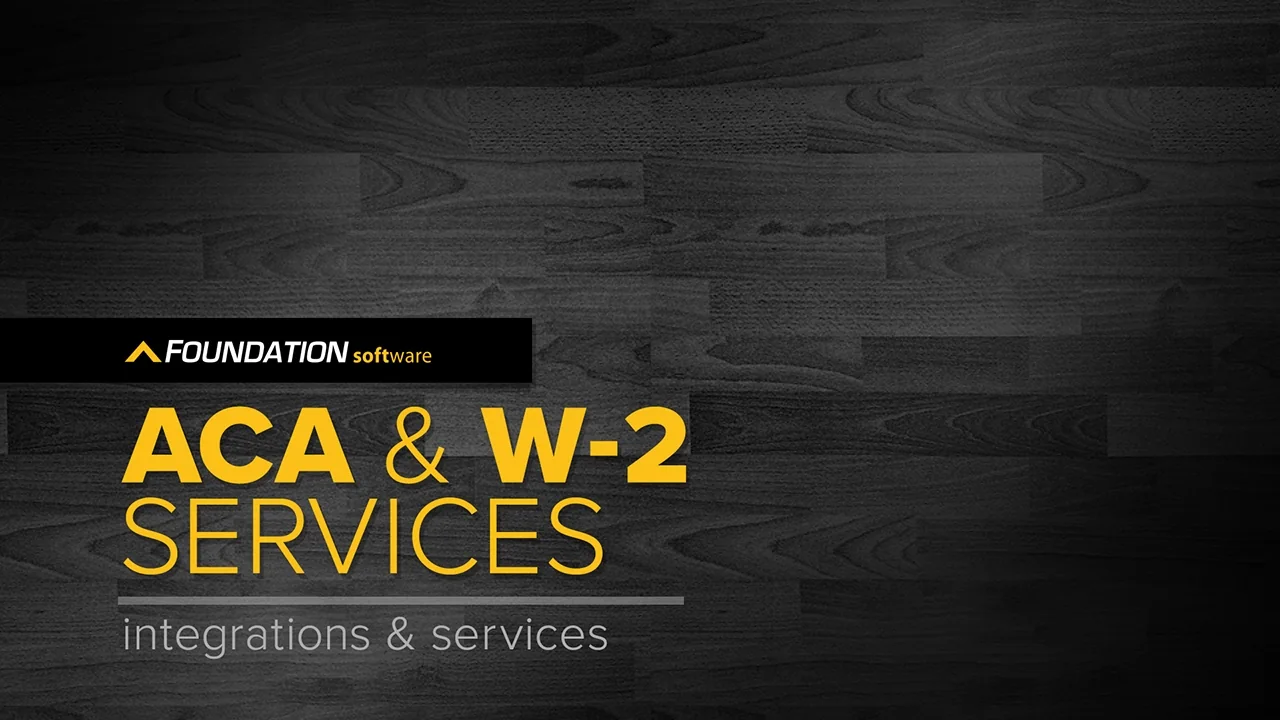
Our ACA reporting & e-filing services include official 1094-C and 1095-C IRS reporting, optional e-filing (no applying for a TCC code required), mailing to your employees and experienced support to help you.

There are plenty of reasons to make FOUNDATION your choice for job cost accounting and construction management software — just ask our clients!
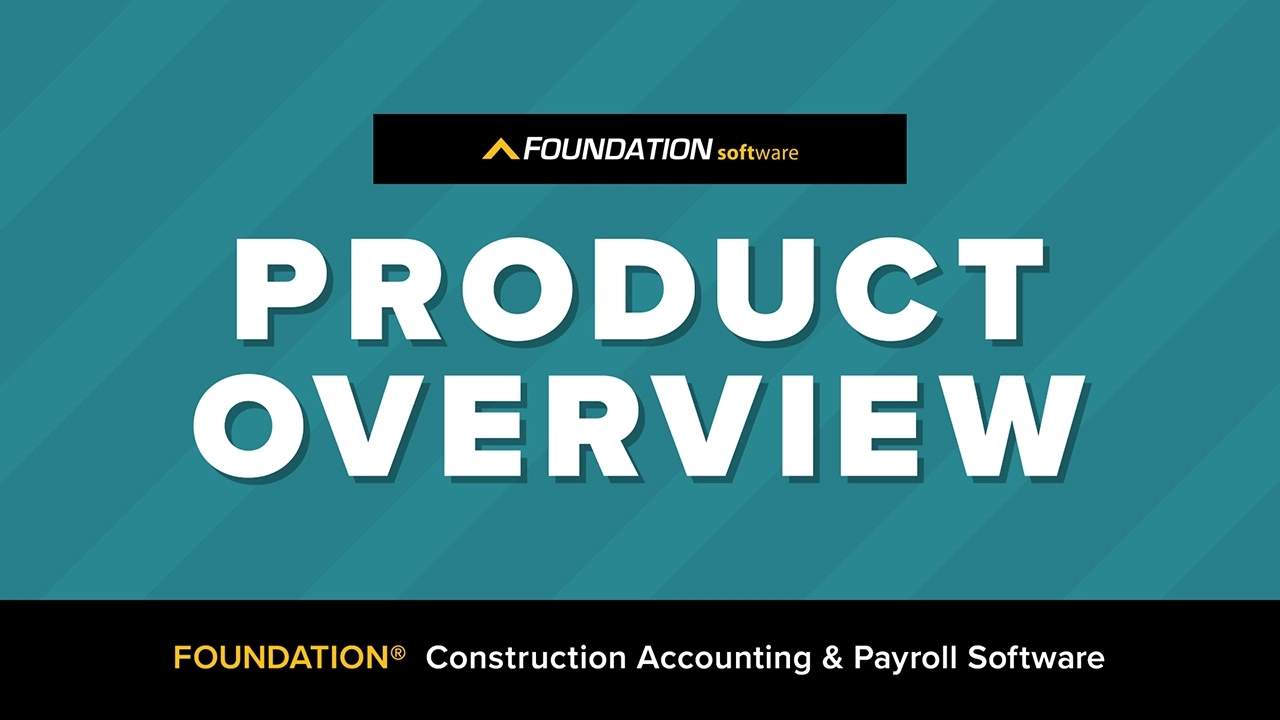
From job cost accounting software, to construction-specific payroll. Get an overview on your next all-in-one back-office solution.



